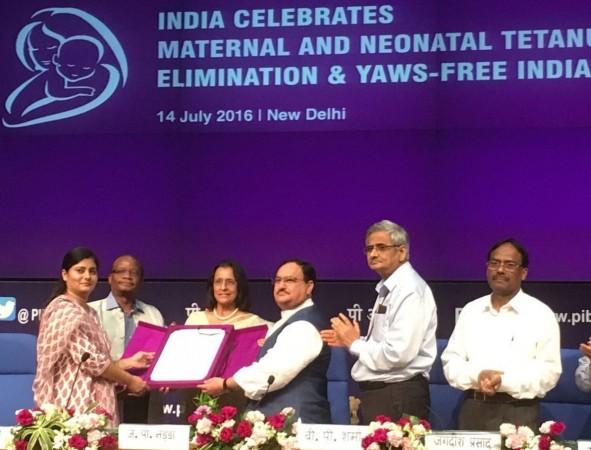
The World Health Organization (WHO) has acknowledged India as the world's first Yaws-free country and declared it free from maternal and neonatal tetanus on Thursday.
"India is the first country to be officially acknowledged as being YAWS-free. India was validated for Maternal and Neonatal Tetanus Elimination (MNTE) in April 2015, much ahead of the global target date of December 2015," an official statement said.
Union Health Minister JP Nadda said in a tweet: "Proud to share that India is being felicitated for elimination of Maternal & Neonatal Tetanus, and being YAWS-free."
"I thank all health workers and stakeholders of India for achieving these significant milestone-elimination of Maternal and Neonatal Tetanus and YAWS," Nadda tweeted.
Nadda received an official citation from the WHO and UNICEF on Thursday in New Delhi.
"This has been possible due to the commitment and dedication of the lakhs of health workers, various stakeholders and concerted efforts of planners and policymakers," the minister said.
According to the WHO, Yaws is a chronic disfiguring and debilitating childhood infectious disease. It spreads through direct contact with the skin of an infected person.
Neonatal tetanus is a form of generalised tetanus that occurs in newborns. It usually occurs through infection of the unhealed umbilical stump, particularly when the stump is cut with a non-sterile instrument. Neonatal tetanus mostly occurs in developing countries, particularly those with the least developed health infrastructure.
Few decades back, India witnessed 1-2 lakh neonatal tetanus cases annually, which have been now reduced to one per 1,000 live births.
Poonam Khetrapal Singh, regional director of WHO South-East Asia Regional Office, said that India has achieved this milestone because of education and early treatment of vulnerable population. "The achievements will not only improve the health of marginalized communities, but will also enhance their socio-economic status and contribute to India's wider development," Singh added.

















